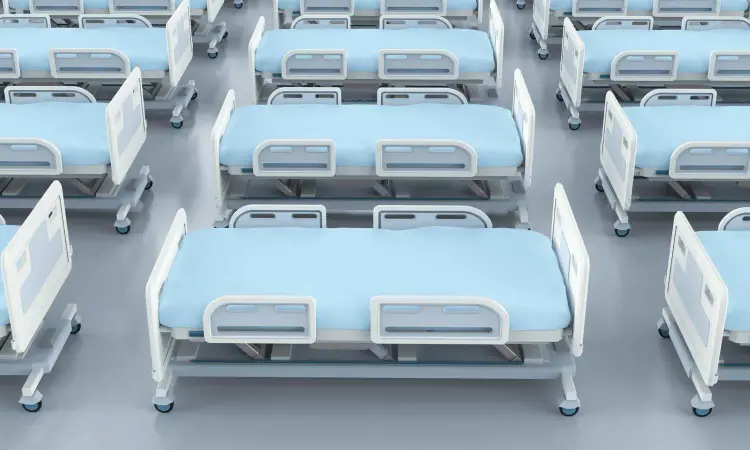- Home
- Medical news & Guidelines
- Anesthesiology
- Cardiology and CTVS
- Critical Care
- Dentistry
- Dermatology
- Diabetes and Endocrinology
- ENT
- Gastroenterology
- Medicine
- Nephrology
- Neurology
- Obstretics-Gynaecology
- Oncology
- Ophthalmology
- Orthopaedics
- Pediatrics-Neonatology
- Psychiatry
- Pulmonology
- Radiology
- Surgery
- Urology
- Laboratory Medicine
- Diet
- Nursing
- Paramedical
- Physiotherapy
- Health news
- Fact Check
- Bone Health Fact Check
- Brain Health Fact Check
- Cancer Related Fact Check
- Child Care Fact Check
- Dental and oral health fact check
- Diabetes and metabolic health fact check
- Diet and Nutrition Fact Check
- Eye and ENT Care Fact Check
- Fitness fact check
- Gut health fact check
- Heart health fact check
- Kidney health fact check
- Medical education fact check
- Men's health fact check
- Respiratory fact check
- Skin and hair care fact check
- Vaccine and Immunization fact check
- Women's health fact check
- AYUSH
- State News
- Andaman and Nicobar Islands
- Andhra Pradesh
- Arunachal Pradesh
- Assam
- Bihar
- Chandigarh
- Chattisgarh
- Dadra and Nagar Haveli
- Daman and Diu
- Delhi
- Goa
- Gujarat
- Haryana
- Himachal Pradesh
- Jammu & Kashmir
- Jharkhand
- Karnataka
- Kerala
- Ladakh
- Lakshadweep
- Madhya Pradesh
- Maharashtra
- Manipur
- Meghalaya
- Mizoram
- Nagaland
- Odisha
- Puducherry
- Punjab
- Rajasthan
- Sikkim
- Tamil Nadu
- Telangana
- Tripura
- Uttar Pradesh
- Uttrakhand
- West Bengal
- Medical Education
- Industry
India Mock Drill: Chandigarh Hospitals directed to strengthen preparedness

Super Specialty Hospital
Chandigarh: As the nation prepares for the nationwide civil defence mock drill scheduled for Wednesday, the UT administration has instructed all medical establishments to stay alert and ensure that windows are covered with thick curtains during the exercise.
The instructions followed a high-level meeting chaired by the UT deputy commissioner, where officials discussed the challenges faced by hospitals, particularly in cutting off electricity, especially due to the critical care needs of certain patients.
While this operational limitation was acknowledged, hospitals have nonetheless been urged to bolster their overall disaster readiness in line with guidelines set forth by the National Disaster Management Authority (NDMA). The standard operating procedures (SOPs) are aimed at ensuring that hospitals remain safe, functional, and capable of providing uninterrupted medical services during and after emergencies.
Also Read: Kolkata Gynaecologist accused of denying treatment to pregnant woman post Pahalgam attack
According to news reports, the system aims to strengthen hospitals' ability to coordinate disaster response by establishing clear authority structures, robust communication protocols, and efficient resource management. In alignment with the National Disaster Management Authority’s (NDMA) Standard Operating Procedures (SOPs), hospitals are upgrading their internal frameworks. A key part of this effort is the creation of dedicated disaster management and coordination centres within hospital premises. These centres function as nerve hubs, facilitating seamless communication between internal teams and external emergency response agencies.
Additionally, hospitals are placing increased focus on regular training and simulation drills for their medical and administrative staff. This includes the establishment of robust triage systems to efficiently classify and prioritise patients during mass casualty incidents, ensuring that those in the most critical condition receive immediate care.
Moreover, hospitals are ramping up their surge capacity by planning for temporary treatment zones, enlisting additional medical personnel, and securing backup medical supplies. These measures ensure hospitals are capable of handling sudden patient influxes without compromising care quality.
Also Read: GMC Jammu Medical Superintendent removed over circular on Pahalgam attack
According to TOI, finally, hospitals are developing plans for post-disaster recovery, which include procedures for assessing damage to hospital infrastructure, providing support to affected staff, and restoring normal operations as quickly as possible. "By implementing these SOPs, hospitals can significantly improve their ability to respond to disasters, minimise damage, and continue providing essential medical services to those in need," said an official.


